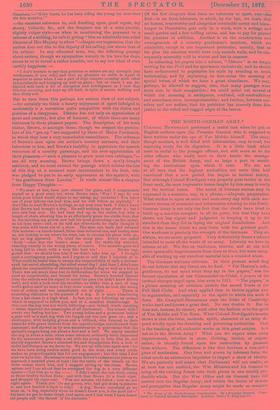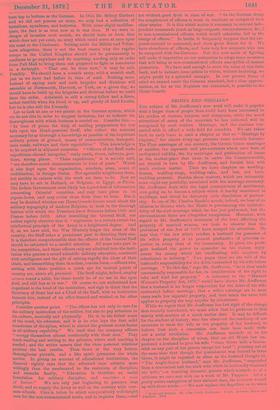THE NORTH-GERMAN ARMY.*
* The Army of the North-pernian Confederation. By a Prussian General. Trans- lated by Colonel Edward Newdigato. London: Henry S. King and Co. COLONEL NEWDIGATE performed a useful task when he put an English uniform upon the Prussian General who is supposed to have written under the eye of Von Moltke himself. The essay, though succinct, is well filled with information, easy to read, but requiring study for its digestion. It is a little book which must be useful to the younger officers, and still more so to the older officers who really have in their hands the manage- ment of the British Army, and so large a part in mould- ing the institutions upon which it rests. We are not at all sure that the highest authorities are more than half convinced that a new period has begun in tactical history. But although Colonel Newdigate very properly puts tactics in the front rank, the most impressive lesson taught by this essay is really not the tactical lesson. The secret of German success may be expressed in a sentence, nay, in a phrase,—adequate preparation. What strikes in upon us more and more every day with each suc- cessive stream of comment and information relating to this North- German Army is not only the fact that the chiefs have tried to build up a machine complete in all its parts, but that they have shown not less vigour and judgment in keeping it up to the standard than they did in laying the original foundations. And this is the lesson which we may learn with the greatest profit. Our weakness is precisely the strength of the Germans. They are always, we are never, prepared. They deliberately frame a scheme intended to meet all the wants of an army. Literally we have no scheme at all. We live on traditions, routine, and at the best make spasmodic improvements from time to time, but seem incap- able of working up our excellent material into a rounded whole. The Germans welcome criticism. In their present mood they do not believe that any forms can be final. " For Heaven's sake, gentlemen, do not mind what they say in the papers," was the fervent ejaculation of our Commander-in-Chief, apropos of the tactical changes urged upon him even in 1871. "The papers," is a phrase meaning all criticism outside the sacred limits of the Pall Mall Clubs. And what applied then to tactics applies now to organisation, and especially to the spirit in which the work is done. Mr. Campbell-Bannerman says the Duke of Cambridge works hard and knows a great deal. No one doubts it. But ho
does not, because he cannot, work after the fashion or in the spirit of Von Moltke and Von Rom. What Colonel Newdigate'a treatise shows is that the form, methods, spirit, character of an army de- pend wholly upon the directing and governing authorities. That is the teaching of all authentic works.on this great subject. Is it
not so in the British Army ? What can we expect when every improvement, whether in arms, clothing, tactics, or organi- sation, is literally forced upon the authorities by pressure from without. The difference is like that between a tree and a piece of mechanism. One lives and grows by inherent force, the other needs an extraneous impulsion to impart a show of vitality. We are perfectly well aware that Parliament will not enable, or at least has not enabled, the War Minister.and his General to bring all the existing forces into their places in one readily pro- ducible whole. But the War Office and its General have full control over the Regular Army, and within the limits of statute and prerogative that Regular Army might be made as complete
from top to bottom as the German. In 1855 Mr. Sidney Herbert said we did not possess an army, we only had a collection of battalions, squadrons, and batteries. With some alight modifica- tions, the fact is as true now as it was then. If we were in danger of invasion next month, we should have to form that which does not yet exist, an army which could move at once upon the coast or the Continent. Setting aside the Militia and Volun- teers altogether, there is not the least reason why the regular troops in the United Kingdom should not be permanently in readiness to go anywhere and do anything, needing only an order from Pall Mall to bring them out prepared to fight or manoeuvre in a fortnight. "That can be done now," it may be said. Possibly. We should have a scratch army, with a scratch staff, just as we have had before in time of need. Nothing more. Instead of saying such and such brigades and divisions will assemble at Portsmouth, Harwich, or York, on a given day, we should have to build up the brigades and divisions before we could issue the order. Athelstan is still a strong fellow and a fierce, rather terrible when his blood is up, and greedy of hard knocks, but he is also still the Unready.
Let us look at one or two points in the German system, which we do not cite in order to suggest imitation, but to indicate the thoroughness with which business is carried on. Consider this:— "In time of peace the duty of making preparations for war falls upon the Head-quarters' Staff, who collect the material necessary for as thorough a knowledge as possible of the important military points of ground, means of communication, transport, main roads, railways and their capabilities." This knowledge is to be acquired in adjacent countries. "Officers of the Staff make expeditions abroad incognito," study roads, rivers, railways, posi- tions, strong places. " These expeditions," it is naively said, "are therefore secret reconnaissances in time of peace." Watch is also kept upon the organisation, numbers, arms, means of mobilisation, in foreign States. Not agreeable neighbours these, but terribly in earnest with the work set them to do. Now we may have to act in Holland, or Belgium, or Egypt, or Persia. The Indian Government moat likely has a good deal of information concerning Oriental countries, and may have plans in its pigeon-holes, and may revise them from time to time. But it may be doubted whether our Horse Guards knows much about the military topography of modern Belgium, at least in the thorough fashion with which the Prussians knew Bohemia before 1866 and France before 1870. After describing the General Staff, our author rightly observes that it " represents to a certain extent the intellectual principle of the Army in'a heightened degree. And if, as we have said, the War Ministry forges the arms of the country, the Staff takes a prominent part in directing their aim. It is therefore comprehensible that the officers of the General Staff should be subjected to a careful selection. All arms take part in the competition, and those officers only are admitted into the insti- tution who possess a sound scientific military education, combined with intelligence and the gift of seizing rapidly the ideas of their chiefs, and transcribing them in a clear, concise form,—officers who, uniting with these qualities a quick eye for tactical points of country are, above all, practical. The Staff might, indeed, employ savants round a table, but these would be of no use in the open field, and still less so in war." Of course we can understand how important is the head of the institution, and sigh to think that the Secretary of State has not a Chief of the Staff, with an institution beneath him, instead of an office framed and worked on far other principles.
Consider another point. "The officer has not only to care for the military instruction of the soldier, but also to pay attention to his culture, mentally and physically. He is, in the fullest sense of the word, his educator, and it is he who lays the first solid foundation of discipline, which is almost the greatest moral factor in all military capability." We read that the company officers " occupy themselves almost continually with their men." They teach reading and writing to the privates, where such teaching is needed; and the writer asserts that the close personal relations produce the best results. Thus down at the very bottom thoroughness prevails, and a like spirit permeates the whole service. In giving an account of educational institutions, the General rightly says that the educated man submits more willingly than the uneducated to the restraints of discipline, and remarks finally, " Education is therefore an useful foundation for military discipline, and nourishes a sense of honour." We are only just beginning to perceive that truth, and to supply the Army as well as the country with com- mon schools. Care is taken to select comparatively well-taught men for the non-commissioned ranks, and to improve them,—and
not without good fruit in time of war. " In the German Army the complement of officers is weak in numbers as compared with other armies. It is this which makes it necessary to entrust inde- pendent commands (such as large outposts, reconnaissances, &o.,) to non-commissioned officers, which would otherwise fall to the charge of officers." In battle it frequently happens that the ser- jeants succeed to command, and show great fitness for it. We have abundance of officers, and have very few serjeants who can be compared with the Germans. But the new mode of fighting will make it imperative on our authorities to adopt some measures that will bring us non-commissioned officers susceptible of instant promotion. We have said enough to show the value of this little book, and to indicate some points iu which, without imitating, wo might profit by a splendid example. In our present frame of mind we cannot reach the German standard, but a close approxi- mation, as far as the Regulars are concerned, is possible to the Horse Guards.







































 Previous page
Previous page